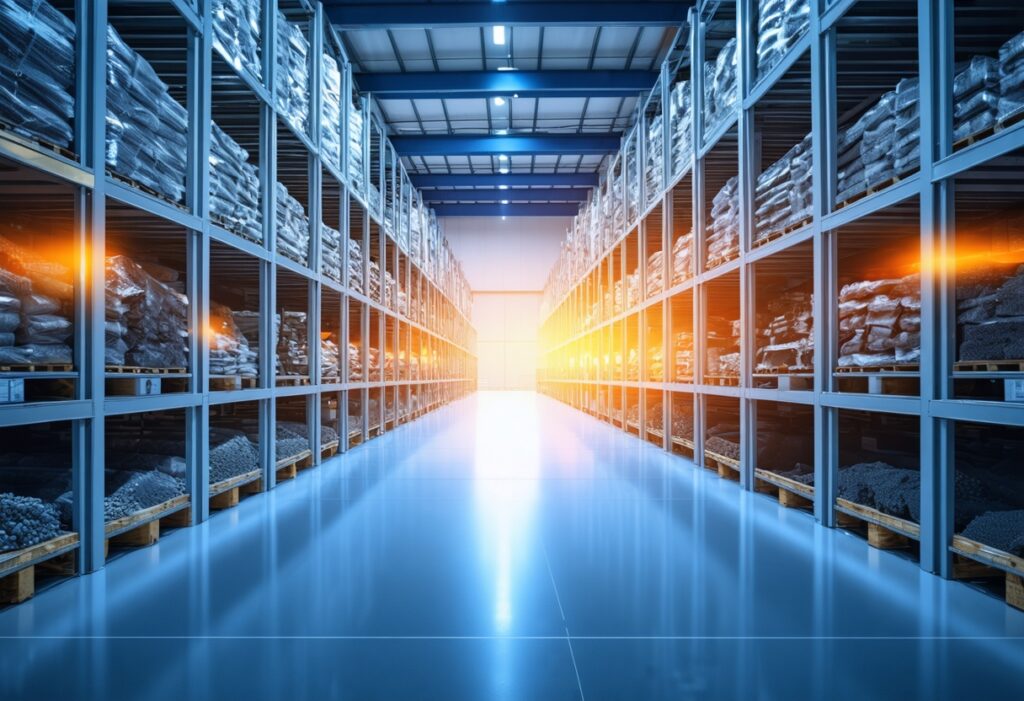Raw material storage is a vital aspect of any business, especially in the rapidly changing world of ecommerce. With the right strategies in place, companies can ensure that their raw materials are protected and efficiently managed, leading to improved productivity, reduced costs, and ultimately, greater customer satisfaction. This article discusses the importance of raw material storage, key factors in efficient storage, strategies for optimizing storage, the impact of proper storage on business operations, and future trends in raw material storage.
Understanding the Importance of Raw Material Storage
Raw material storage plays a significant role in the overall success of ecommerce businesses. It involves the proper handling, organizing, and safeguarding of raw materials that are necessary for production or fulfilling customer orders. By ensuring that raw materials are stored in optimal conditions, companies can prevent spoilage, reduce the risk of damage or contamination, and maintain inventory accuracy.
The Role of Raw Material Storage in Ecommerce
In ecommerce, raw material storage takes on added significance. With the rise of online shopping and the need for quick order fulfillment, having well-managed raw material storage facilities is crucial. It enables businesses to maintain high inventory turnover rates, meet customer demands promptly, and avoid stockouts or delays in product delivery.
Key Factors in Efficient Raw Material Storage
Efficient raw material storage relies on several key factors. Firstly, it is important to have a well-organized storage system in place. This can include categorizing raw materials based on their nature, size, or shelf-life, and using appropriate labeling and coding systems to ensure easy identification and retrieval.
For example, in the food industry, perishable raw materials such as fruits and vegetables need to be stored separately from non-perishable items like grains or canned goods. This segregation helps prevent cross-contamination and ensures that each type of raw material is stored at the optimal temperature and humidity level.
Secondly, maintaining optimal storage conditions is important. Factors such as temperature, humidity, and exposure to sunlight can affect the quality and lifespan of raw materials. Implementing proper insulation, ventilation, and monitoring systems can help prevent damage caused by unfavorable environmental conditions.
For instance, in the pharmaceutical industry, certain raw materials may require refrigeration to maintain their efficacy. By investing in temperature-controlled storage units and implementing temperature monitoring systems, companies can ensure that these materials are stored within the recommended temperature range, preserving their quality and effectiveness.
Lastly, implementing robust inventory tracking and management processes is vital. This includes conducting regular audits, accurately recording incoming and outgoing materials, and adopting a system like Finale Inventory, which provides real-time inventory visibility and helps streamline restocking processes.
By utilizing advanced inventory management software, businesses can automate inventory tracking, generate accurate reports, and set up automated reorder points. This not only saves time and reduces human error but also ensures that raw materials are replenished in a timely manner, minimizing the risk of stockouts and production delays.
Raw material storage is a critical aspect of ecommerce operations. By implementing efficient storage systems, maintaining optimal storage conditions, and utilizing advanced inventory management tools, businesses can enhance their productivity, meet customer demands, and stay ahead in the competitive online marketplace.
Strategies for Optimizing Raw Material Storage
Optimizing raw material storage involves implementing various strategies that focus on improving efficiency and reducing waste. Below are two important approaches:
Implementing an Inventory Management System
One of the most effective strategies for optimizing raw material storage is to adopt a comprehensive inventory management system, such as Finale Inventory. This system provides businesses with the tools needed to track raw material levels, monitor expiry dates, and automate replenishment processes. With real-time visibility into inventory, companies can make informed decisions and avoid stockouts or overstocking.
An advanced inventory management system can generate reports and analytics that offer insights into consumption patterns, demand forecasting, and supplier performance. By analyzing this data, businesses can streamline their procurement processes, negotiate better terms with suppliers, and optimize their raw material storage based on actual usage trends.
Adopting a First-In-First-Out (FIFO) Approach
A key principle of raw material storage is adherence to the first-in-first-out (FIFO) approach. This means that the oldest inventory should be used or sold first to minimize wastage and ensure freshness. By following this approach, businesses can reduce the risk of raw materials becoming obsolete or spoiling due to prolonged storage.
In addition to FIFO, another effective approach is the Last-In-First-Out (LIFO) method, which can be beneficial in certain industries or scenarios. LIFO allows companies to prioritize the use of recently acquired raw materials, which can be advantageous during periods of inflation or when there are fluctuations in material costs. By understanding the pros and cons of different inventory management methods, businesses can tailor their storage strategies to suit their specific needs and market conditions.
The Impact of Proper Raw Material Storage on Business Operations
Proper raw material storage has a significant impact on various aspects of business operations:
Enhancing Productivity through Effective Storage
Efficient storage systems allow for quick and easy access to raw materials. This saves time and effort in locating and retrieving the required materials, enabling employees to focus on core tasks. With enhanced productivity, businesses can meet customer demands efficiently, increase output, and achieve better overall operational efficiency.
Reducing Wastage and Costs with Proper Storage
Effective raw material storage helps minimize wastage and reduce costs. By implementing proper inventory management practices, such as FIFO, businesses can prevent product spoilage or obsolescence. Additionally, optimizing storage conditions can prevent damage or deterioration due to unfavorable environmental factors. These measures ultimately lead to cost savings and improved profitability.
Ensuring Quality and Consistency in Production
Proper raw material storage plays a key role in maintaining the quality and consistency of products. By storing materials in appropriate conditions, such as temperature-controlled environments for perishable items, businesses can ensure that the raw materials retain their integrity. This, in turn, translates to high-quality end products that meet customer expectations and uphold the company’s reputation for excellence.
Compliance with Regulatory Standards
Effective raw material storage is essential for ensuring compliance with regulatory standards and industry requirements. Proper storage practices help businesses adhere to guidelines related to safety, sanitation, and environmental protection. By storing materials correctly and securely, companies can avoid fines, penalties, or legal issues that may arise from non-compliance, safeguarding their operations and reputation.
Future Trends in Raw Material Storage
The field of raw material storage continues to evolve, driven by technological advancements and a growing emphasis on sustainability. Two notable trends are:
Technological Innovations in Storage Solutions
Advances in technology are revolutionizing raw material storage. Companies are increasingly adopting automated storage and retrieval systems, leveraging robotics and artificial intelligence to improve efficiency and accuracy. These innovations allow for more effective space utilization and better tracking, leading to optimized inventory management.
One exciting technological innovation in raw material storage is the use of drones. These unmanned aerial vehicles can be utilized to monitor and manage inventory in large warehouses. Equipped with advanced sensors and cameras, drones can quickly and accurately assess stock levels, identify any potential issues, and even assist in the retrieval of specific materials. This not only saves time and reduces human error but also enhances overall operational efficiency.
The Role of Sustainability in Storage Strategies
With the rising awareness of environmental sustainability, businesses are incorporating eco-friendly practices into their storage strategies. This includes using energy-efficient storage systems, implementing recycling programs, and choosing sustainable packaging materials. By prioritizing sustainability in raw material storage, companies can reduce their carbon footprint and align with growing consumer expectations.
Another aspect of sustainability in raw material storage is the adoption of renewable energy sources. Many companies are investing in solar panels and wind turbines to power their storage facilities. By harnessing clean energy, businesses not only reduce their reliance on fossil fuels but also contribute to a greener future. Additionally, some innovative storage solutions incorporate rainwater harvesting systems, allowing companies to utilize natural resources and minimize water wastage.
Effective strategies for raw material storage are important for ecommerce businesses to ensure productivity, reduce costs, and meet customer demands. By understanding the importance of raw material storage, considering key factors in efficient storage, implementing optimization strategies, and keeping up with future trends, companies can stay ahead of the competition and navigate the evolving landscape of ecommerce with confidence.
Transform Your Inventory with Finale
Request a Free consultation (valued at $2,500) and let us tackle solving your biggest inventory management challenges with Finale Inventory and experience the difference Finale Inventory can make for your business.






